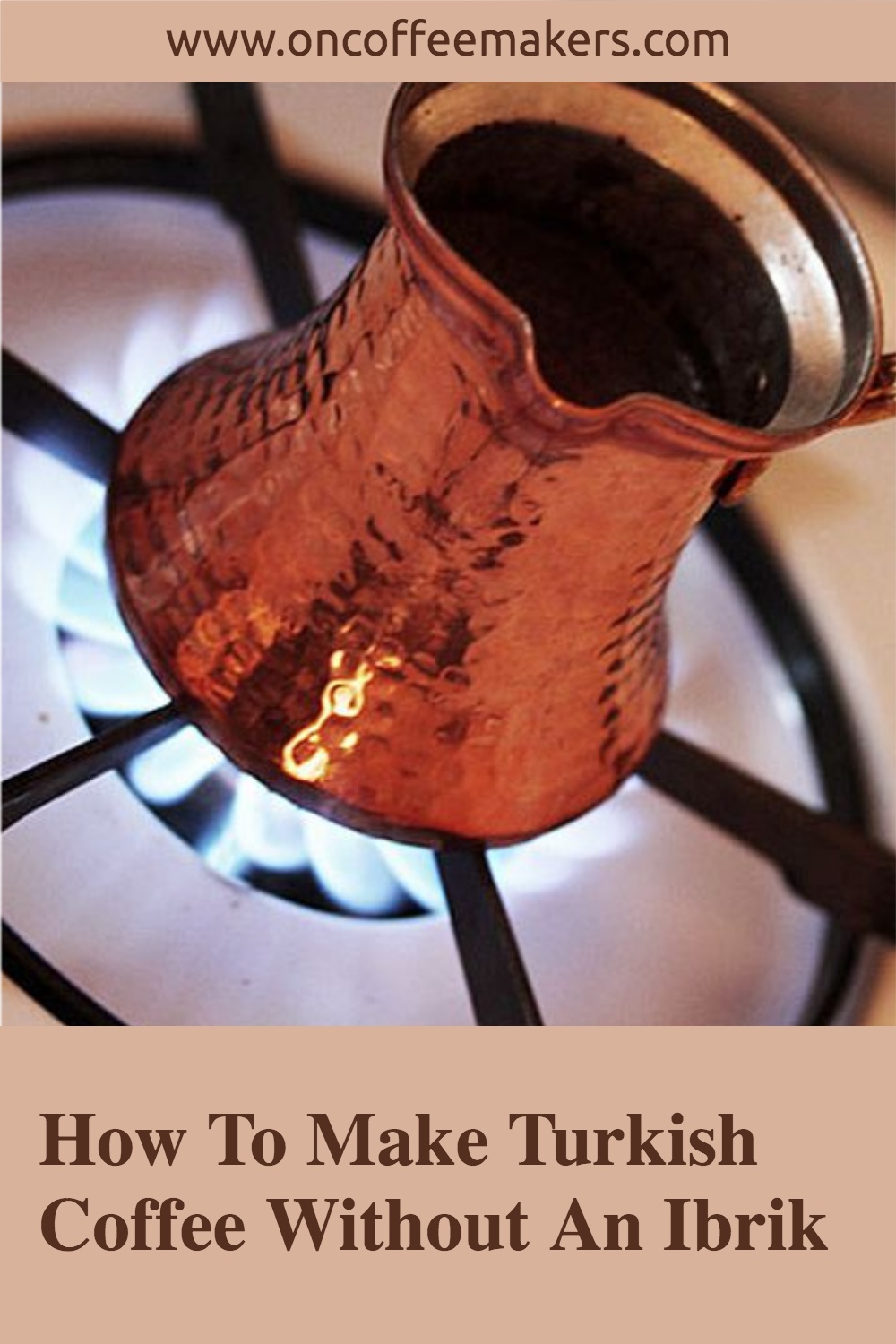How To Make Turkish Coffee
Without An Ibrik?
Turkish coffee can be made without the use of an Ibrik, we'll show you how.

There is no substitute for Turkish coffee's thick, rich flavor because it is produced in a unique way using an Ibrik, a copper pot that most people don't own.
Turkish coffee appeals to me because it allows me to have delicious coffee in a comfortable setting.
I don't need a French press or coffee equipment to make coffee that rivals many cafes. Turkish coffee is exceptionally wonderful and calming, yet it's as easy to make as chai.
Using a unique method, Turkish coffee creates a robust and flavorful brew.
Turkish coffee is traditionally prepared in an ibrik, but if you don't have one at home, you can still make a cup of Turkish coffee. You only need a tiny pot, some coffee, and a careful eye to avoid a huge disaster in your kitchen if your coffee boils over.
You're missing out if you're a fan of robust, bold coffee but haven't tasted Turkish coffee. There is no substitute for Turkish coffee's thick, rich flavor because it is produced in a unique way.
Traditional Turkish coffee is traditionally made in an ibrik, a copper pot that most people don't own.
You need an ibrik if you want to prepare Turkish coffee in the traditional way because the small surface area helps the foam rise to the top.
The ibrik is not necessary if you only want a smooth cup of coffee that can be prepared on the stovetop.
In order to prepare Turkish coffee the traditional way, you'll need to use more water (or the number of Turkish coffee cups). Be aware that it won't froth like it would in a traditional ibrik.
- Making Turkish Coffee with an Ibrik:
Set your coffee grinder to the finest setting. Turkish coffee grounds look and feel like flour. We don't think you can grind the coffee too finely for Turkish coffee, so don't be shy. Aim for 2 to 3 tablespoons per cup of water.
Since Turkish coffee is pretty strong, you might want to start with less, 2 - 3 tablespoons. Put 16 ounces of water into a small pot or saucepan, stir the coffee into the water.
Over medium heat, bring the coffee almost to a boil. The coffee will start to foam as it gets close to boiling. As soon as you see foam on the coffee, take it off the heat and wait for the foam to go away. You want to turn off the heat before the coffee boils.
Once the foam has settled, repeat the process, heating over medium heat until foam starts to form. If you don't want the coffee to taste bitter, you can skip this step and only heat the coffee once.
Bring out the coffee. Turkish coffee is usually served in small cups like those used for espresso, but you can use a full-sized cup instead. If you don't want to chew your coffee, you should let the grounds settle in the cup for a few minutes before taking your first sip.
- Milk and Sugar
People often put milk and sugar in their coffee, and there's no rule that says you can't do that with Turkish coffee. Authentic Turkish coffee is usually served without either of these, but you can add them if the taste is too strong. We suggest that you try your coffee without milk or sugar first and only add them if you need to.
- Adding Flavor
Cardamom seeds or ground cardamom are used in a lot of Turkish coffee recipes to give it an extra kick. Cardamom gives Turkish coffee a new twist and makes it even more unique and tasty. Add one cardamom pod to your coffee before you boil it if you want to try it. Use 1/8 teaspoon of ground cardamom if that's all you have.
By Douglas
Other Latte Art Questions
How to Steam Milk for Latte Art without Machine?
How to Steam Milk at home for Latte Art?
Other Questions about Coffee
How much does it cost to rent a espresso machine?
Questions not about coffee (but important to coffee)
About US | OCM Profile
OCM (OnCoffeeMakers.com) was started in 2007 with the first webpage about coffee machines. And for a number of years, we focused on helping people find their desired coffee machine (we still are helping folks with that! So, if you are looking for coffee machines for office or restaurants - check out the link).
In 2010, we started getting enquiries on restaurant marketing and we start to help food and beverage brands with their marketing. Below are campaigns and events that we have done over the years:
OCM's campaigns: F&B Marketing Ideas by OCM
OCM's Events: F&B Industry events by or with OCM
Check out this restaurant marketing guide to learn more about the many campaigns and companies we have worked with.
Since then, we have also created many marketing workshops and classes for the F&B industry. Many of these modules are still running in tertiary institutions such as Temasek Polytechnic Skillsfuture Academy and also ITE College East COC classes, below are some snippets of our lectures and workshops:
OCM’s F&B workshops: Food and Beverage Marketing Lectures | Workshops - click to watch classes on customer journey map, JTBD and more.
So, if you are looking for industry practitioners to help you scale your coffee or F&B businesses, do drop us a message or book an appointment. Do also check out our various social media platforms on regular F&B and coffee market updates:
For regular coffee (F&B) related videos: OCM Youtube
For Daily Coffee Inspiration (fun coffee content): OCM IG
For insights into the coffee (F&B) industry: OCM LinkedIN
PS: For the coffee lovers, we continue to share coffee articles (and videos) and have also started a free coffee class section (with free online coffee training supported by coffee partners).